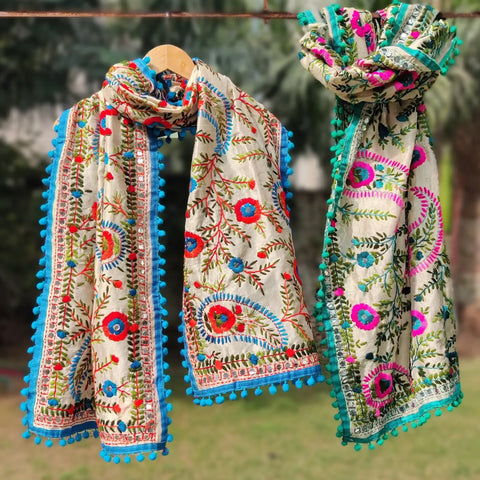Every traditional textile of India reflects art, culture, ethnicity and different stories. Clothes with “Phulkari” designs are not an exception from that. Having the captivating flavour of the landscapes and ethnicity of Punjab, these Phulkari Stoles can provide you with an unconventional touch of beauty and style. If you want to know about the allure of Traditional Phulkari Stoles and want to try this in this upcoming winter, this article may help you on a practical note.

Phulkari: A Legacy in Thread
By keeping focus on the term Phulkari, you can understand that it refers to “flower work”. To know the origin of this textile, you have to go to the enchanting land of Punjab long ago, when women used to sit in a circle and meticulously embroider these stoles. Using brightly coloured silk threads on coarse cotton fabric, they would create intricate patterns that ranged from geometric shapes to floral motifs. Each stitch was a labour of love, passed down through generations as a symbol of familial bonds and cultural identity.
The workmanship that goes into the Phulkari
A Phulkari Stole must be meticulously made, taking a great deal of care and talent. Colourful silk threads and a needle are used for the needlework. The vivid threads and the base fabric provide a striking contrast when the designs are meticulously sewn on a simple fabric.
Traditional Phulkari Stoles are known for their variety in nature. Every Phulkari stole is distinct from the next, with variations in pattern and colour schemes. The designs frequently feature geometric patterns, flowers, and birds—all of which have symbolic meanings in Punjabi culture.
Let’s Have a Clear Look on the Types of Phulkari Embroidery
Now, after taking a deep focus on the workmanship in weaving Phulkari Stoles, now it's time to look into the various forms of Phulkari embroidery. If you are quite choosy in terms of picking up things to wear, these varieties of Phulkari may blow your mind.
Thirma: Symbolising purity, Thirma Phulkari is traditionally worn by elder women and widows. Its subdued palette and delicate motifs reflect a sense of reverence and tradition.
Darshan Dwar: Designed with temple visits in mind, Darshan Dwar Phulkari features motifs and patterns that evoke spirituality and devotion. It is often adorned with symbols that hold religious significance.
Bawan Bagh: Among the rarest forms of Phulkari, Bawan Bagh showcases a mosaic of fifty-two distinct patterns. Each pattern intricately weaves together to create a masterpiece of complexity and artistic skill.
Chope: Characterised by its single-coloured embroidery, Chope Phulkari is typically used to adorn the borders of fabrics. Its simplicity highlights the craftsmanship and attention to detail.
Surajmukhi: Drawing inspiration from the vibrant sunflower, Surajmukhi Phulkari is adorned with patterns that mimic the flower’s radiance and energy. It symbolises positivity and vitality.
Kaudi Bagh: Featuring chains of small white squares resembling stylized cowries, Kaudi Bagh Phulkari showcases geometric precision and elegance in its design.
Panchranga and Satranga: These Phulkari types are distinguished by their use of multiple colours—Panchranga with five different chevrons and Satranga with seven. These vibrant patterns symbolise joy, celebration, and festivity.
Meenakari: Inspired by the art of enamel work, Meenakari Phulkari incorporates small multicoloured lozenges against a background of gold and white. It reflects opulence and sophistication in its design.
Each type of Phulkari embroidery not only showcases the skill of the artisans but also carries deep cultural and symbolic meanings. Whether worn for religious ceremonies, celebrations, or everyday adornment, traditional Phulkari stoles adorned with these intricate embroideries continue to enchant and captivate admirers worldwide.
The Timeless Elegance
Despite their traditional roots, Phulkari stoles have evolved into a versatile fashion accessory that complements both traditional and contemporary attire. Whether draped elegantly over a shoulder at a festive occasion or paired with casual jeans and a blouse, these stoles add a touch of heritage and sophistication to any outfit. The vibrant colours and intricate designs make them not just a piece of clothing, but a statement of style and cultural pride.
Worldwide Attraction
Outside of Punjab, Phulkari has gained lovers worldwide. The stoles are valued for their cultural significance as well as their visual appeal by both fashion fans and collectors. Phulkari stoles are now worn on cultural events and fashion runways, crossing international boundaries to represent India's rich textile legacy.
Visit the Site of iTokri: Buy Hand Embroidered Phulkari Stoles Online
Step into the timeless world of Phulkari with iTokri, where you can discover authentic hand-embroidered Traditional Phulkari Stoles. Imagine yourself draped in these vibrant creations, each telling a story of Punjab's rich cultural heritage. Whether you're drawn to the intricate patterns of Thirma or the festive colours of Panchranga, iTokri offers a variety that suits every taste and occasion. Perfect for cultural events, casual outings, or adding a touch of tradition to your modern attire, these stoles are more than just accessories—they're a celebration of artistry and heritage. Explore our collection today and adorn yourself with the essence of Punjab's artistic legacy.

Final Thought
Traditional Phulkari Stoles epitomise Punjab's cultural richness with vibrant hues and intricate designs. From the revenant Thirma to the festive Panchranga, each type showcases artistry and deep-rooted tradition. Evolving from heirlooms to global fashion statements, these stoles transcend borders, captivating admirers worldwide. Whether worn at celebrations or on runways, Phulkari stoles from iTokri and similar platforms blend heritage with elegance, symbolising cultural pride and timeless style.
 Verified Purchase
Verified Purchase



































































Leave a comment (all fields required)